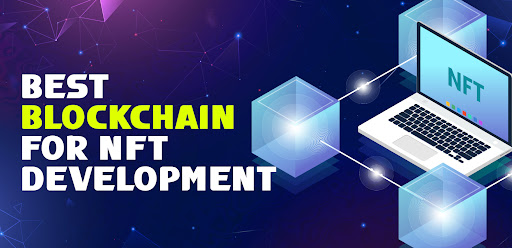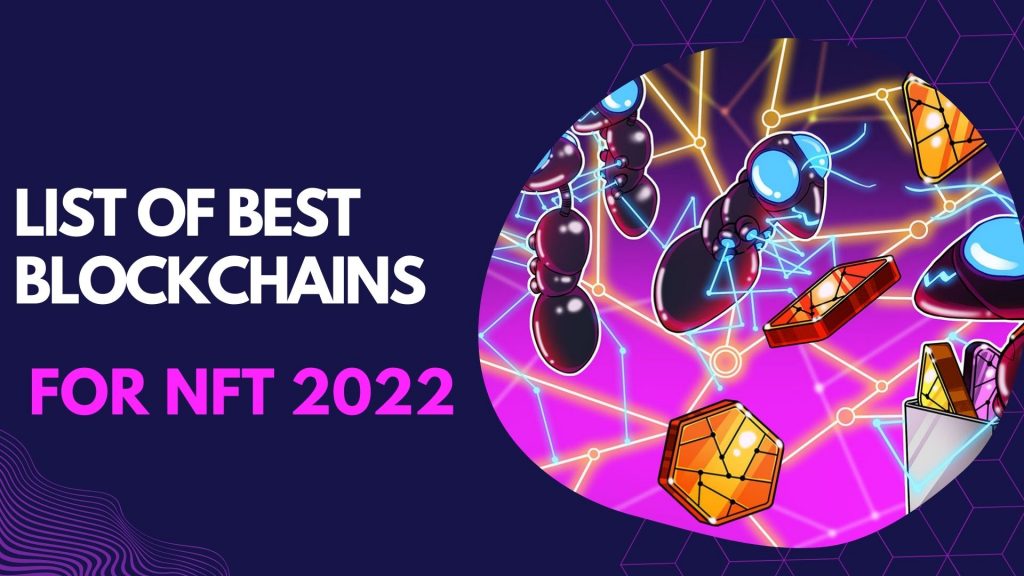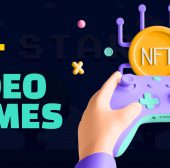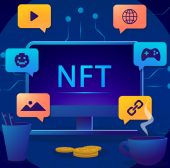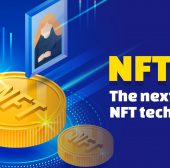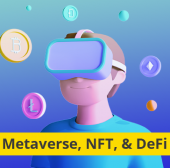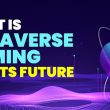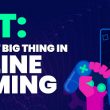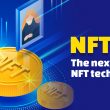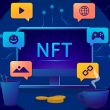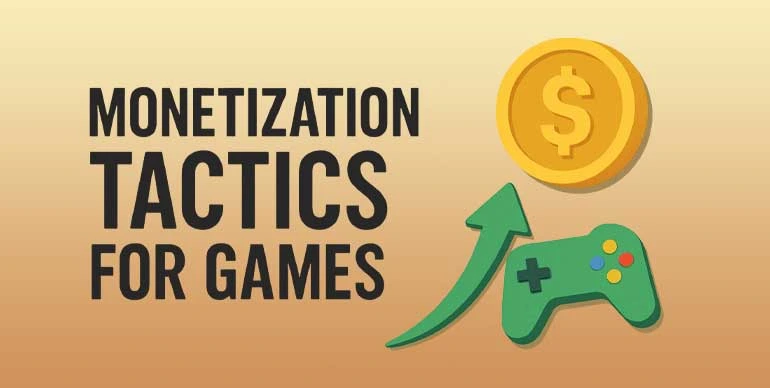What are blockchain technology and NFT?
In order to comprehend NFT better, let us first take a step back and understand blockchain technology. Blockchain is a kind of database in which data is stored in blocks that are chained together. Each blockchain transaction exists in blocks that have been confirmed and approved by the computer network. A blockchain can either be decentralized or centralized, and cryptocurrency is linked with a database that is decentralized. This technology decentralizes data storage for transactions, as well as the ownership of NFTs. Blockchain records the transaction of authorization, ownership, and transfer publicly, which can be accessible to all users.
NFTs, on the other hand, are digital tokens that are stored on the blockchain and represent virtually any item. They have particular IDs in the form of code that links them to a specific address inside the chain. It can be a tokenized representation of images, playing cards, in-game items, videos, etc. These tokens are unique and provide the token holders with proof of ownership as well as the authenticity of the underlying asset. Also, since they are non-fungible, they cannot be traded or exchanged for another NFT, making them rare and valuable.
With so many blockchains to choose from, how do you know which one is the best blockchain for NFT for you and the difference among them? In today’s article, we will take a close look at just that.
How to decide on the best blockchain for NFT development?
With so many blockchains available these days, it is becoming harder to select the one that will best serve as the foundation for your NFT development. However, there are a number of factors that must be considered when looking for the best blockchain for NFT development. This includes the following:
Smart contract functionality
All NFT platforms depend on smart contracts that govern the trade between buyers and sellers. In general, well-crafted smart contracts ensure the platform’s security. As a result, it is vital to ensure that the blockchain you choose must possess a reliable and robust smart contract functionality. To provide the highest level of efficiency as well as resilience, smart contracts must be rigorously tested. This will ensure that users and developers have the lowest possible risk of hacks, downtime, and breaches in NFT marketplaces.
Transaction cost
Cost-effectiveness is another factor to consider before choosing the best blockchain for NFT. Making NFT-based transactions requires cost-effective methods, as not every transaction will require the exchange of millions of dollars in works of art. However, microtransactions, like virtual collectables, card games, and in-game virtual assets, can significantly make up NFT-based transactions.
Security
The importance of security cannot be overstated, especially when dealing with a company or organization that handles confidential data. Moreover, portals with a PoW (proof of work) consensus process are vulnerable to attacks and can lead to loss of access, money and data. Eventually, decentralization is jeopardized. So, to avoid security breaches, select a blockchain that has a proven track record of keeping a security history of peer-review and mining-free consensus mechanism, such as proof of stake.
Transaction speed
Speed is the crucial factor for the successful operation of a digital system. Transaction speed is mainly considered for the domains that involve the transfer and storage of value. Nevertheless, speed should not be exchanged for lack of security or high cost, as in the case with many blockchains.
Now that you know the parameters to consider when selecting the best blockchain for NFT, we can look into the most prevalent blockchains and their capabilities. The following is the breakdown of the main types, ensuring you can pick one that meets your needs.
List of Best blockchains for NFT 2022
Ethereum
Ethereum is the oldest and best blockchain for NFT creation. It features its own cryptocurrency called Ether (or ETH). Ethereum is an open-source platform for creating and running decentralized apps based on blockchain technology. The transactions on this blockchain are processed in ‘gas’. Gas fees are the fees you pay in order to use the Ethereum blockchain network. It is a scalable platform that includes a plethora of standards for various types of smart contracts.
Ethereum is a driving factor behind two well-known token standards, ERC-721 (for the creation of NFTs) and ERC-1155 (for creating new semi-fungible tokens). These two standards have served as the foundations for the vast majority of the current NFTs, and this trend will probably continue.
Flow
Flow is another best blockchain for NFT. It is a fast and decentralized blockchain that facilitates the creation of decentralized apps. The native currency of this blockchain is Flow and was created primarily for games and digital assets. Many crypto fans have been drawn to Flow which is often referred to as an alternative to Ethereum. This proof-of-stake (PoS) blockchain can power entire ecosystems of apps, especially those related to digital assets and games. The NBA was one of the first main companies to use Flow, which was followed by the MotoGP, NFL, and esports teams. Since then, the crypto world has praised it and is gaining popularity. One of the notable aspects of the Flow is its speed, and that too without any excessive gas fees. This blockchain produces intensive scaling, and unlike Ethereum, it does not employ the sharding technique. It has its own NFT standard, which is the ERC-721 counterpart. Other aspects that set it apart include upgradeable smart contract features, human-readable security, the finality of transactions, and smart use account recovery possibilities. As it was expressly built to work effortlessly with non-fungible tokens, this blockchain is ideal for NFT developers and artists.
Solana
Solana (SOL) is an open-source blockchain that allows smart contracts, non-fungible tokens, and a wide range of decentralized apps. Proof-of-history (PoH) and proof-of-stake (PoS) consensus methods are used to build the Solana blockchain. It is a high-performance decentralized blockchain technology designed to allow for the scalability of user-friendly apps. Solana’s most notable characteristic, which made it easier for its widespread acceptance, is its fast transaction speed and low-cost transactions. Like Ethereum, Solana is a Layer 1 solution that aims to provide an interoperable ecosystem for any projects that use its network.
WAX
WAX (Worldwide Asset Exchange) is another famous network for decentralized games as well as NFT trading. This blockchain platform was created in 2017. As a consensus mechanism, it is a carbon-neutral blockchain that uses delegated proof-of-stake (DPoS). In WAX, the token holders vote on delegates who serve as validators for new blocks. Wax is widely regarded as the most environmentally friendly and conscious blockchain. This has shown to be a feasible blockchain solution for establishing marketplaces. It is one of the best blockchain for NFT and is home to some of the most popular NFT-powered games like R-Planet, Alien World, and Kolobok Adventures. To date, there are two WAX-power portals that allow you to sell and/or acquire NFTs: Atomic Hub and NeftyBlocks.
Tezos
Introduced in 2018, Tezos is a decentralized open-source proof-of-stake blockchain that can perform peer-to-peer transactions and operate as a platform for smart contract deployment. Though it has only one NFT standard, i.e. the FA2 standard, it is gradually gaining attention. It functions using its native token, XTZ. Over the past years, Tezos NFTs have grown in popularity, with prominent marketplaces like Rarible, which now offers Tezos-based NFTs. The community of Tezos has been rapidly developing the platform, with the latest enhancements that have improved performance and extended the smart contract size limit. The gas charges on Tezo are less than a penny, and the speed of transactions is fast. Tezos, one of the best blockchain for NFTs has also created tools to aid in the automation of incorporating NFTs into the supply chains of enterprises.
Tron
Tron is another looming blockchain for NFTs. Tronix, the Tron currency, is pre-minded and can be exchanged on Binance as well as other exchanges. This blockchain standard is the world’s fastest-growing public blockchain network, with over a million accounts and a billion transactions. Tron is a decentralized blockchain-based platform with the goal of creating a free and global virtual content entertainment system. The Tron blockchain provides excellent scalability and developer-friendly tools within a diverse ecosystem of apps. It is a distributed ledger system that enables easy access to digital content at little or no cost. This makes it a highly in-demand crypto coin to develop a wide range of decentralized apps along with gaming dApps.
Polygon
Polygon is a Layer 2 solution for ETH that enables the creation of scalable and faster solutions with the use of autonomous smart contracts. The key benefit of this decentralized blockchain is that it is compatible with the virtual machine of Ethereum and has an economical gas fee. An advantage that allures people is its ‘lazy minting’ function, which means there will be no upfront charges when producing NFTs. However, when a non-fungible token is sold, there is a cost that must be paid. Polygon blockchain has already been used to create a number of NFTs, which can easily be found in the OpenSea marketplace by choosing the suitable blockchain. Its future potential includes incorporating additional base chains in addition to Ethereum. This will enable interoperability between multiplayer Layer 1 solutions using Polygon’s smart contract technologies, which are fast as well as scalable.
Final Words
Blockchain games are becoming increasingly famous in the gaming world due to the ongoing buzz around NFTs, blockchain tech, and cryptocurrencies in general. NFT in gaming, an amazing new creation of blockchain technology has forever revolutionized the gaming world and grabbed the interest of both players and game app developers. The gamers now see the in-game objects with other eyes. As NFT is closely connected to gaming and digital art, they contribute effectively to the broad adoption of blockchain technology.
Learn more about blockchain technology and NFT with Logic Simplified. For any suggestions or queries, you can contact us or drop us an email at enquiry@logicsimplified.com
 Get a Quote
Get a Quote

